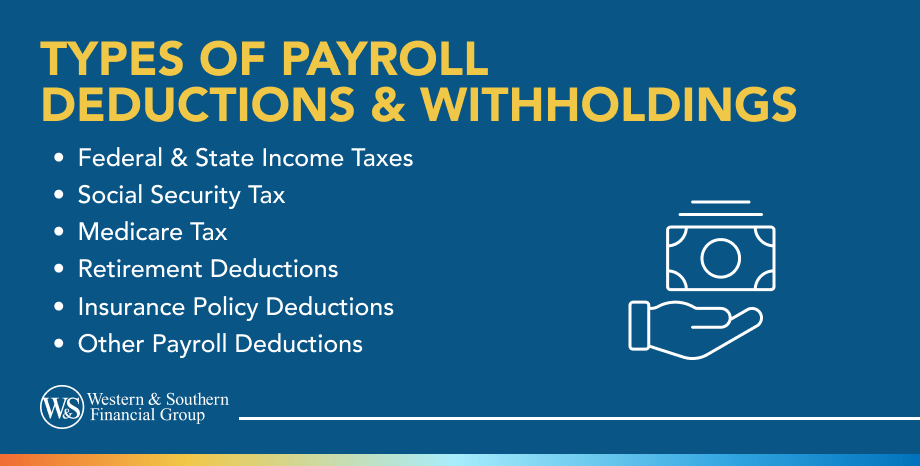Table of Contents
Table of Contents


Key Takeaways
- Income taxes fund public services, based on your tax status and income.
- Social Security taxes of 6.2% support retirement benefits up to $168,600.
- Medicare taxes of 1.45% fund senior health care, with extra above $200,000.
- 401(k) contributions allow pre-tax retirement savings, capped at $23,500 in 2025.
- Other deductions include insurance, savings accounts, and union dues.
You get your paycheck, but there's a big difference between your gross and net earnings. Taxes and different types of payroll deductions account for this part. If you're unsure of what these deductions are and how they affect your take-home pay, here's some information to keep in mind.
Federal & State Income Taxes
Your employer withholds taxes from every paycheck. Federal and state taxes, which are used to fund public services like infrastructure and education, are taken out of your gross income and determined by how you fill out your W-4 form.
Your tax filing status, tax bracket and taxable income, which is the amount of your income that's subject to tax after you've taken any allowable deductions and exemptions, all affect how much federal tax you pay. Most people pay federal income tax unless their income is low and the deductions and credits available to them wipe out their tax liability. If you live in a state with no state income tax, then you won't see a state payroll withholding.
Social Security
Employer Withholds for Social Security
You'll also see a line item on your paycheck for Social Security or Federal Insurance Contributions Act (FICA) taxes. You pay into Social Security throughout your working years. Beginning at age 62, you can start collecting benefits based on what you've contributed to Social Security taxes. If you collect benefits before your full retirement age, defined by the year in which you were born, your monthly benefit will be reduced.
Medicare Tax
This payroll deduction, which is also grouped into FICA taxes on your paycheck, is used to fund the federal health care program for seniors. Your employer is required by federal law to:
- Withhold 1.45% of your income in taxes to pay into the program, according to the IRS.2
- Pay 1.45% to the federal government
- Total = 2.9%.
If you make more than $200,000 in a calendar year, there is a .9% Additional Medicare Tax.
Similar to Social Security, you can begin to receive Medicare benefits once you reach a certain age. You'll be eligible for Medicare once you turn 65.
Retirement Deductions
All of the items above are mandatory deductions, but you also can take voluntary deductions. Retirement deductions fall into this category.
If you have a 401(k) or 403(b) through work, your employer may withhold part of your pretax income to deposit into these retirement plans based on your election to contribute or if there is an automatic deferral provision. Some retirement plans also have a Roth account type available, which would have you pay taxes on your contributions as you make them rather than when you withdraw the money in retirement. These taxes will also be deducted from your paycheck.
In either case, you likely determine the percentage of your income to contribute. Your employer is not responsible for withholding income for any individual retirement accounts (IRAs) you might hold.
401(k) Contributions
Insurance Policy Deductions
If you have employer-sponsored health, dental or vision insurance, you'll pay for your monthly premiums via a payroll deduction. Your employer will likely deduct the required amount and send that payment to your insurance company directly.
If you have voluntary benefits like life insurance, a flexible spending account or a pretax health savings plan to pay for out-of-pocket health care costs, you'll also contribute to these plans via a payroll deduction.
Other Payroll Deductions & Withholdings
Depending on your personal situation, you may encounter additional deductions and payroll withholdings. Some of these can include wage garnishments for child support, union dues or payments for back taxes you owe.
Payroll Deductions & Your Take-Home Pay
The different types of payroll deductions are more than just line items on your paycheck. Many of them are used to fund a variety of public services and federal programs like Social Security and Medicare.
Next time you see things like FICA or federal and state income taxes on your pay stub, you'll likely have a better understanding of where your money goes and why.
Save consistently for retirement through customized payroll deductions. Get My Free Financial Review
Sources
- Fact Sheet - Social Security. https://www.ssa.gov/news/press/factsheets/colafacts2024.pdf.
- Topic No. 756, Employment Taxes for Household Employees. https://www.irs.gov/taxtopics/tc756.
- Retirement Topics - 401(k) and Profit-Sharing Plan Contribution Limits. https://www.irs.gov/retirement-plans/plan-participant-employee/retirement-topics-401k-and-profit-sharing-plan-contribution-limits.























